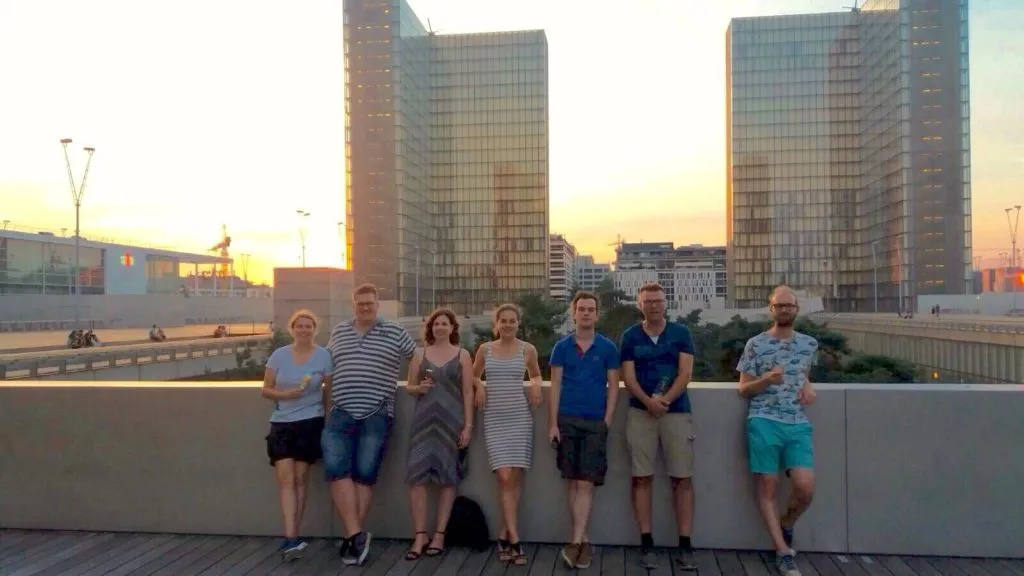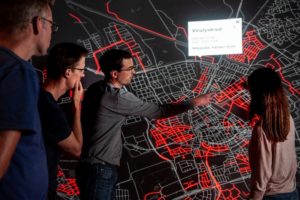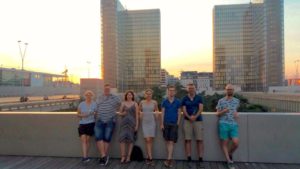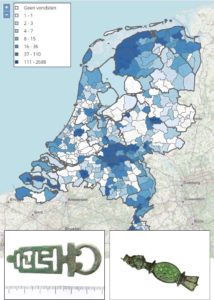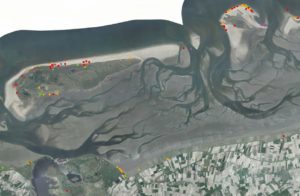Extracting actionable business intelligence is a challenge for many companies. Add spatial data to the mix and the challenge just got a whole lot more complicated. One startup that is helping tackle this challenge is IMGeospatial. IMGeospatial applies artificial intelligence to Earth-observed and other remote sensed data in a unique manner to extract actionable intelligence for businesses over time. Established in 2015, IMGeospatial has already collaborated with the likes of The World Bank, The European Space Agency, Affinity Water, Anglian Water and the State of Nevada’s Water Start. IMGeospatial provides simple solutions that help management and field teams make more effective and timely decisions across multiple sectors, including automotive, utilities, insurance, smart cities and non-governmental organisations (NGOs).
Fun fact: The IMG in IMGeospatial is a reference to (remote sensing) images!
We spoke to Alexis Hannah Smith, the founder of IMGeospatial to learn more about their business, her vision for the future and more. Read on!
Q1: Alexis, it’s a pleasure! Thanks for taking the time. Before we start chatting about IMGeospatial, just out of curiosity, as someone with no prior geospatial background, what chain of events lead you into starting a geospatial start-up?
I am a very inquisitive entrepreneur and ever since I can remember have been fascinated by quantum physics and Earth sciences. In the course of developing business ventures, I devised an invention that averts flooding. Consulting with experts in this field led to a water utility in the UK revealing to me that one of the most troublesome problems their sector faced was in understanding the pluvial risk to their infrastructure. They allowed me to come back to them with a proposition for solving that, and the rest is history. I’m not a scientist but I surround myself with people who are the best at what they do, like genius developers of software and algorithms. Their expertise, coupled with my unique way of viewing problems from a business rather than an academic perspective, allows us at IMGeospatial to achieve great things.
Q2: “Extracting automated intelligence for businesses” – this sentence was one of the first things that I noticed on your website. But what exactly does this mean and how is your start-up different from all the other companies out there that provide business intelligence?
Extracting automated intelligence for businesses means collecting location-based data from a variety of sources, digesting, distilling then disseminating this insight and delivering it to our clients, how, where and when they need it. We have automated the data pipeline so our clients have access to intelligence that would otherwise have been too complex, inaccurate or expensive to tap, and because no human intervention is required their teams are freed up to focus their time, energy and expertise on solving bigger problems. It’s effectively data as a service, which is often subscription based. The end products integrate into our clients’ daily workflow, enabling them to carry out activities in a more streamlined, efficient and effective manner.
Several things set us apart. Firstly, the data that we collect from multiple sources can be digested, distilled and disseminated in a matter of days, not weeks, or months, or longer, meaning our clients get an almost real-time view of the intelligence that they require. Secondly, we have completely automated the data pipeline from the moment that data is collected to the moment insights are delivered to clients. No human intervention is required, at all, meaning our clients are free to focus on what they do best, which is running their business. Thirdly, we operate in a uniquely streamlined way, reducing the time and effort it takes to generate insights from raw data, which has the knock-on benefit of our being highly competitive.
We enable small businesses, nonprofits, and emerging countries to join the data revolution. Access to valuable insights should not be limited to companies with massive budgets or a staff of engineers.
Q3: With all the buzz around AI, it’s easy to see the lure behind it. That being said, what competitive advantage does AI provide you? What do you use AI for?
Artificial Intelligence (AI) gives us a competitive advantage, because of the way in which we deploy it in our automated data pipeline, which is unique to IMGeospatial. Our proprietary technology enables our AI to precisely and accurately structure data in an unsupervised fashion, reducing our reliance on costly human resources to generate business intelligence from raw data.
We don’t use AI for everything, because it’s not a ‘fix all’ thing, it’s just a tool. The key is in picking the right tool for the job and understanding how to use it in the best way. It’s about understanding what you’re trying to get out of data and if you can do it via an automated data pipeline.
Q4: Is AI a challenge/liability when working on projects for the insurance industry? How do you understand and deal with bias?
We strip human bias from inherently flawed human systems, accepting data for what it is, which is imperfect.
As the ecosystem of data expands, so do the opportunities to impact the quality of raw data we use and structured data that we create. For instance, sensors break, views are obstructed, and human intervention brings human error. Traditional engineering practices “clean” the data to improve their results. But we live in an imperfect world filled with imperfect, open data, so AI must be able to recognise how errors or gaps bring truth and reality to insights, rather than model human bias into results.
Our proprietary technology automates the QA process and can model the impact of errors in data, rather than ignore that data altogether. This minimises the potential for human bias and, as a bonus, allows us to use smaller data sets that lower the underlying cost of business intelligence.
Q5: IMGeospatial has completed projects with the likes of the World Bank, Anglian Water and the Royal Institute of Chartered Surveyors (RCIS) to name a few. What does actionable intelligence look like in each of these diverse cases?
IMGeospatial has partnered with three clients to address the biggest water related threats to our livelihood: flooding, water scarcity and water quality. We provide business intelligence that helps them to proactively manage their water systems, build resilience in their communities, and ultimately minimise risk and impact.
In the UK, water utilities and the government bodies that regulate them, have ramped up their efforts to reduce water loss, but inaccessible private lands and vast rural areas make it difficult to locate where these losses occur in a timely and efficient manner.
IMGeospatial is helping a large UK water utility take the guesswork out of this process. Using various sources of publicly available and remote sensed data, we’re empowering leakage analysts to identify and investigate water loss in the District Metered Areas they cover, and have provided them with a work order system that will increase the efficiency of field officers to access and address those issues.
Again, in the UK, the country’s water supply is constantly threatened from diffuse pollution. However, with some catchments exceeding 1,000 km2, identifying the various sources of pollution is a daunting, if not impossible challenge for water companies. We’re helping a water utility to tackle this challenge with technology that can not only identify and locate land and crops that are highest risk, but that can also determine the aquifers that they’re most likely to impact. Using a variety of data sources, we quickly and cost-effectively identify points of interest to which a catchment field officer can be dispatched to investigate, saving valuable time and resources for our client.
In the insurance sector, we’ve worked with the Royal Institute of Chartered Surveyors to help them autofill their Rebuild Calculator.
Finally, IMGeospatial is providing the World Bank with an automated data pipeline and field tool that helps resource-constrained urban planners in Tanzania to assess their communities’ flood exposure, make recommendations that build flood resilience and plan better for emergency response teams. Also, since planners operate in an environment where mapping of communities is a significant challenge, our data delivery tool enables them to gather, input and share useful structure and land use details.
Q6: IMGeospatial had its origins in assessing the risk of floods. You have come a long way in the past 3 years. What does the future look like?
IMGeospatial started out in helping a water utility in the UK to identify the pluvial risk of their infrastructure, and we came to realise very quickly that our automated data intelligence can be applied to solve problems in a multitude of sectors. In a short space of time, since 2015, we’ve worked with the likes of the World Bank, numerous utility companies, insurance organisations, the European Space Agency and more.
In the future, we will continue to work in tandem with our existing clients and partners, while also branching into new sectors, tailoring the most effective and cost efficient, data related solutions to pretty much any business problem. Always with a focus on creating positive societal change. We’ll also continue to champion and campaign for diversity of thought, which is critical to avoiding bias in the AI revolution.
Q7: IMGeospatial seems to be working with an enviable tech stack; do you maybe provide us some insights into it?
Our primary technology is called AIMEE, which stands for Automatic Intelligent Multi-feature Extraction Engine. It’s an unsupervised ecosystem of algorithms that uses machine learning, AI and remote sensed imagery to create Automated Business Intelligence. AIMEE ‘Digests, Distils and Disseminates’ remote sensed data to produce industry or sector specific intelligence, which helps businesses in multiple sectors to solve any number of problems. The insights that it provides are tailored to whatever the client needs, enabling them to make efficient and effective decisions, saving them time and resources. This has a knock-on effect of saving their clients time and making processes for the end consumer smoother.
Take insurance for example, our clients have a data rich view of the landscape with ninety five percent accuracy, which removes the necessity to send a surveyor around to manually measure and identify things. It also means that their customers don’t need to manually submit loads of details to ensure they’re getting the right level of cover, as the data is already there. The technology and insights that we provide frees people within our clients’ teams from getting bogged down in data processing and analytics, enabling them to concentrate on solving bigger picture problems and putting their core stills to better use.
Q8: You are based out of Slough, UK, which isn’t too far from London (the home of Geovation). With all this talk of Brexit, how’s the start-up scene?
Last I heard, the start-up scene is booming; I recall the chancellor of the exchequer saying a few months ago that one tech start-up is registered in the UK per hour, which is staggering. Within any business there are always problems, Brexit is just something else that may be added to the mix, we’ll have to wait and see what comes up and deal with any issues along the way, if there are any.
Q9: What’s your advice to budding geo-entrepreneurs wanting to build their own business?
As with any entrepreneurial new venture you need to be genuinely passionate about what you’re doing (which will help with the 4.30am starts!) and believe in the positive change that you have the capability of making to global society.
My advice to any budding geo-entrepreneurs is to embrace diversity in all its forms, gender, sexuality, geographic, professional backgrounds and so on, to avoid bias and to foster true diversity of thought. Also, to embrace collaboration, which I think applies to established players as well as new kids on the block. We can all achieve so much more if we’re prepared to support one another, share ideas and resources.
What we’re doing benefits people on the ground in very real terms. From estimating the flood risk profile and estimated financial impact for an urban planner’s ward in Tanzania, to identifying with accuracy the sources of diffuse pollution in a water catchment manager’s aquifer, or enabling insurance adjusters to calculate the replacement cost for properties in their covered portfolio. No two days or scenarios of the people that we’re helping are the same. It’s a very rewarding path to tread.
Q10: Any closing comments?
Isn’t geo awesome?! Thank you to Muthu and your readers for your support and interest in IMGeospatial.
The Next Geo is supported by Geovation:
 Location is everywhere, and our mission is to expand its use in the UK’s innovation community. So we’re here to help you along your journey to success. Get on board and let’s start with your idea…
Location is everywhere, and our mission is to expand its use in the UK’s innovation community. So we’re here to help you along your journey to success. Get on board and let’s start with your idea…
Learn more about Geovation and how they can help turn your idea into reality at geovation.uk
About The Next Geo
The Next Geo is all about discovering the people and companies that are changing the geospatial industry – unearthing their stories, discovering their products, understanding their business models and celebrating their success! You can read more about the series and the vision behind it here.
We know it takes a village, and so we are thrilled to have your feedback, suggestions, and any leads you think should be featured on The Next Geo! Share with us, and we’ll share it with the world! You can reach us at muthu@geoawesomeness.com or via social media ?
